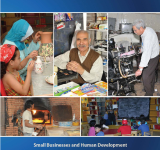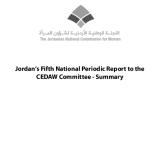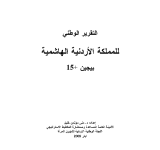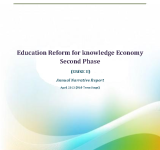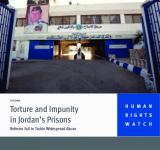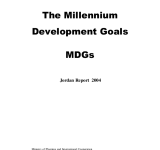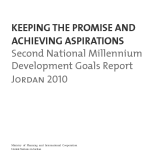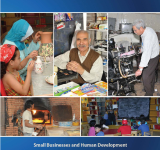This report explores the role of Small and Medium-Enterprises (SME);; as an agent for sustainable human development in Jordan. It analyzes SMEs and their contribution to human development using fours key central pillars of human development;; namely: economic growth that is equitable and pro-poor;; social progress;; participation and empowerment through micro finance;; and environmental sustainability. The report analyses the link between SMEs and empowerment or lack thereof;; with a specific focus on the two issues of employment;; as a tool for empowerment;; and the capacity of SMEs to enhance the position of women within the workforce and home. The report findings were based on extensive research;; a survey of 1;;500 firms and focus groups discussions conducted across the governorates of Jordan. The report proposed general recommendations in terms of institutional coordination;; exports;; cluster groups;; quality standard;; government monitoring;; tax law;; local development;; youth empowerment and the increase of minimum wage.
development
هذا التقرير يستعرض جميع السياسات والتشريعات والممارسات والاجراءات الوطنية لبيان مدى اتفاقها مع الالتزامات المبنية في اتفاقية القضاء على جميع اشكال التمييز ضد المرأة;; بالاضافة إلى القاء الضوء على مساهمة المرأة في التنمية السياسية والاقتصادية والاجماعية. اضافة إلى ذلك;; فإن هذا الملخص يعرض الانجازات والتحديات ذات الصلة بحقوق المراة في مجال المساواة وعدم التمييز التي وردت في التقرير على صعيد: المشاركة في الحياة العامة;; محور التشريعات ;; محور الأمن البشري والحماية الاجتماعية;; ومحور التمكين الاقتصادي;; ومحور الاعلام.
هذا التقرير يرصد الانجازات التي حققها الأردن فيما يتعلق بمتابعة منهاج عمل بيجن خلال الفترة (4004-2009);; ومتابعة وتقييم سير البرامج والمشاريع التي تطبقها اللجنة الوطنية الأردنية لشؤون المرأة الأردنية;; ودراسة الصعوبات والمشاكل التي تواجه تنفيذ البرامج المختلفة;; والعمل على ايجاد الحلول الناجعة لها. وكانت المنهجية المتبعة معتمدة على مراجعة للأدبيات السابية ومراجعة للتشريعات;; اضافة إلى الاعتماد على نتائج المسوحات والاحصاءات الصادرة والمنشورة من قبل دائرة الاحصاءات العامة;; وذلك الى جانب بناء استمارة لحصر البيانات والمعلومات المتعلقة بالمرأة والنوع الاجتماعي في القطااع الرسمي. وكانت ابرز المواضيع المطروحة في التقرير: المرأة;; الفقر;; الصحة;; العنف;; الاقتصاد;; الاعلام;; البيئة;; الطفلة الأنثى;; الحقوق;; حقوق المراة;; والنزاعات المسلحة.
The second phase of the Program Education Reform for the Knowledge Economy Program (ERfKE II) continues to build on the achievements of the first phase and follow the same implementation arrangements that have proven to be successful in (ERfKE I);; and in the same time;; focuses on schools as the locus of change as well as on the need to enhance capacity building at the central and field levels. The development objective of (ERfKE II) is to provide students enrolled in pre-tertiary education institutions in Jordan with increased levels of skills to participate in knowledge economy. Also the Mid-Term review highlighted the concrete progress achieved by (ERfKE II) in several key areas related to policy development;; quality of education interventions and school construction;; and identified the key issues as a summary of the overall progress that will be tackled and addressed during the remaining stage of implementation.
يتضمن هذا التقرير تحليلاً موسعاً ومتكاملاً لمؤشرات الفقر بالاستناد الى بيانات مسح نفقات ودخل الأسرة لعام 2008;; الذي نفذته دائرة الاحصاءات العامة على أربع جولات ميدانية استمرت سنة;; والذي انتهى العمل به مع نهاية الربع الأول لعام 2009. وبناءاً على بيانات هذا المسح تم اعداد تقريرين سابقين: الأول كان فيه عرض للنتائج الرئيسية للمسح والآخر تناول قياس مؤشرات الفقر باستخدام منهجية السعرات الحرارية المعتمدة من قبل البنك الدولي ومقارنتها عبر الزمن بالأسعار الثابتة. وبناءاً عليه تم تم اعداد هذا التقرير التحليلي لحالة الفقر في الأردن;; وذلك بمشاركة العديد من الجهات الوطنية المعنية بالفقر. وكما يتناول التقرير تحليلاً للتدخلات الحكومية المباشرة بالأسعار الجارية خلال عام 2008 في الحد من ظاهرة الفقر.
The Millenium Development Goals Report has been prepared through the active participation of the Jordanian Government and the UN Country Team. As scorekeeper of the MDGs;; UNDP supported the Ministry of Planning and International Cooperation in this joint endeavor. The objectives of this report are to create a baseline situation;; monitor progresses made to date;; and indicate what should be done in order to achieve the MDGs. The concluding section of fostering global cooperation gives an overview of national efforts to strengthen the basis and improve the environment for developing strong partnerships to achieve macroeconomic stability and other important national objectives.
Jordan’s second Millennium Development Goals Report 2010 shows the extent to which progress has been made towards achieving those targets and highlights the challenges that still confront the country to achieve these goals. The report seeks to identify the policies required for meeting the MDG targets by the year 2015;; at a time when the United Nations and the World’s governments are exerting a collective effort to review the progress achieved to date and identify the obstacles standing in the way of meeting the goals and targets by 2015.
The report highlights the essential role played by micro;; small and medium enterprises in the promotion of human development in the country;; and through four main pillars;; namely economic growth;; that is inclusive and pro-poor;; social progress;; participation;; empowerment throw micro finance;; and environmental sustainability. The report consists of eight chapters dealing with: the concept of human development through small and medium enterprises;; human development in Jordan;; economic growth;; social progress;; empowerment;; the role of microfinance to empower less advantaged groups;; and a chapter on sustainable development.
